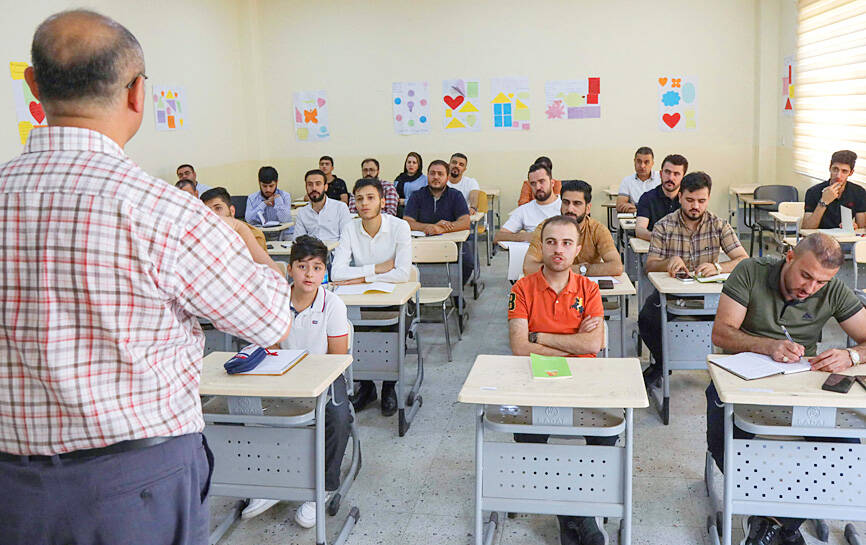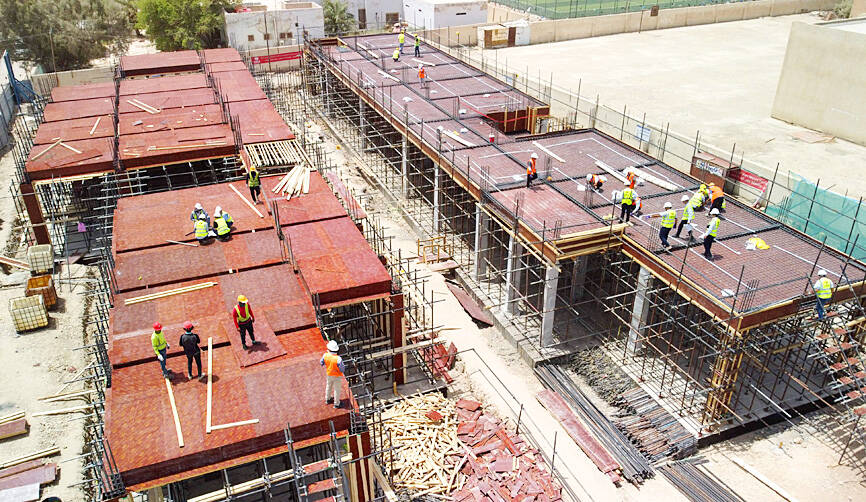China has gained a major foothold in oil-rich Iraq, shaking up Western domination in fields from energy to construction, even as some warn that infrastructure projects could leave Baghdad in debt.
After decades of conflict, Iraq is “badly in need of foreign investment, and specifically investment in energy sector infrastructure,” said John Calabrese, a senior academic at the Middle East Institute in Washington.
China, with its soaring energy needs, has stepped in to fill that gap, and is expanding its presence in Iraq under a 2019 “oil for construction” deal.

Photo: AFP
Beijing has become one of the largest importers of Iraqi crude, and last year accounted for 44 percent of Iraq’s oil exports, Iraqi prime ministerial adviser Muzhar Saleh said.
State firm PetroChina has partnered with France’s TotalEnergies and Malaysia’s Petronas to exploit the Halfaya oilfield in southern Iraq.
“China is just getting started,” Chinese Ambassador to Iraq Cui Wei (崔巍) told journalists in a videoconference.

Photo: AFP
However, Beijing is interested in more than just Iraq’s trade potential, Calabrese said.
Beyond the “obvious commercial incentives” are China’s ambitions to “deeply entrench itself in a country and a region that the West, and especially the United States, has dominated,” he said.
Iraq is among the many partners in China’s vast Belt and Road Initiative, which Western leaders say risks saddling poorer countries with debt.
Baghdad is an “important cooperation partner” in the project, a Chinese Ministry of Foreign Affairs spokesman said, adding that Beijing had “actively participated in the reconstruction of Iraq’s economy.”
From 2013 to this year, Iraq was “the third most important” Belt and Road Initiative partner “for energy engagement,” according to a paper by Christoph Nedopil of the Green Finance and Development Center at Fudan University in Shanghai.
Under the 2019 “oil for construction” deal, building projects in Iraq are funded by the sale of 100,000 barrels per day of Iraqi oil to China.
One aspect of the agreement, inked while then-Iraqi prime minister Adel Abdel Mahdi visited Beijing, was a deal to build schools.
Two Chinese partners were tapped to carry out the construction — PowerChina and Sinotech — with 8,000 education facilities to eventually be built.
Work has also begun on an airport in the southern city of Nasiriyah, built by the China State Construction Engineering Corp.
Under such projects, Chinese firms must work with local contractors that “provide manpower and raw materials,” Iraqi government spokesman Haider Majid.
Yesar al-Maleki, an analyst for the Middle East Economic Survey, said there was “a big question mark” over how the Iraqi contractors are selected.
“Many of these companies are rumored to be politically connected, and this is how they got the contracts,” he said.
Iraqi contractors could abuse the initiative for “useless projects,” he said, adding that Iraq could end up in a “death trap” of debt.
As China’s influence grows, more and more Iraqis have also been taking their business to China.
Banking on this, the Iraqi-Chinese Friendship Association in Baghdad has begun offering classes in Mandarin.
“When I returned to Iraq from China, I found that a lot of people wanted to learn the language,” 25-year-old teacher Sajjad al-Kazzaz said.
The majority of his students are businessmen, like Laith Ahmed, who imports electronics from China.
Ahmed cited challenges communicating with Chinese traders, “most of whom do not speak English,” but said that this had not stood in the way of business.
“Chinese products have flooded the Iraqi market,” Ahmed said.

THE TRAGEDY OF PUNCH: Footage of the seven-month-old Japanese macaque has gone viral online after he was rejected by his mother and formed a bond with a soft toy A baby monkey in Japan has captured hearts around the world after videos of him being bullied by other monkeys and rejected by his mother went viral last week. Punch, a Japanese macaque, was born in July last year at Ichikawa City Zoo. He has drawn international attention after zookeepers gave him a stuffed orangutan toy after he was abandoned by his mother. Without maternal guidance to help him integrate, Punch has turned to the toy for comfort. He has been filmed multiple times being dragged and chased by older Japanese macaques inside the enclosure. Early clips showed him wandering alone with

South Korea would soon no longer be one of the few countries where Google Maps does not work properly, after its security-conscious government reversed a two-decade stance to approve the export of high-precision map data to overseas servers. The approval was made “on the condition that strict security requirements are met,” the South Korean Ministry of Land, Infrastructure and Transport said. Those conditions include blurring military and other sensitive security-related facilities, as well as restricting longitude and latitude coordinates for South Korean territory on products such as Google Maps and Google Earth, it said. The decision is expected to hurt Naver and Kakao

Australian Prime Minister Anthony Albanese yesterday said he did not take his security for granted, after he was evacuated from his residence for several hours following a bomb threat sent to a Chinese dance group. Albanese was evacuated from his Canberra residence late on Tuesday following the threat, and returned a few hours later after nothing suspicious was found. The bomb scare was among several e-mails threatening Albanese sent to a representative of Shen Yun, a classical Chinese dance troupe banned in China that is due to perform in Australia this month, a spokesperson for the group said in a statement. The e-mail

MONEY GRAB: People were rushing to collect bills scattered on the ground after the plane transporting money crashed, which an official said hindered rescue efforts A cargo plane carrying money on Friday crashed near Bolivia’s capital, damaging about a dozen vehicles on highway, scattering bills on the ground and leaving at least 15 people dead and others injured, an official said. Bolivian Minister of Defense Marcelo Salinas said the Hercules C-130 plane was transporting newly printed Bolivian currency when it “landed and veered off the runway” at an airport in El Alto, a city adjacent to La Paz, before ending up in a nearby field. Firefighters managed to put out the flames that engulfed the aircraft. Fire chief Pavel Tovar said at least 15 people died, but